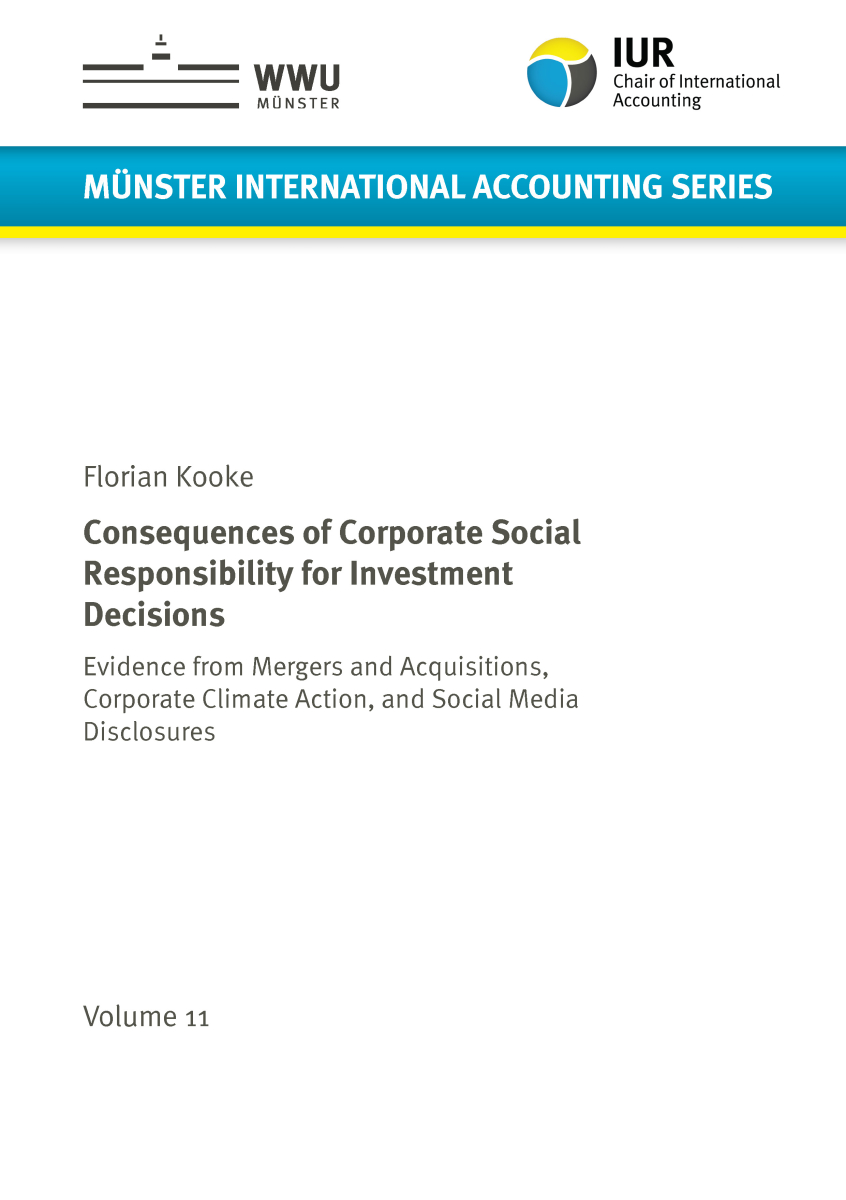Volume 11
Florian Kooke - Consequences of Corporate Social Responsibility for Investment Decisions - Evidence from Mergers and Acquisitions, Corporate Climate Action, and Social Media Disclosures

Society’s heightened sustainability awareness and investors’ demand for green and socially responsible investments exert pressure on firms to act sustainably. Firms react to this pressure by integrating social and environmental issues into their decision making, real actions, and disclosure practices. In this context, the thesis empirically explores the consequences of CSR for firm-level and investor-level investment decisions by examining what role CSR plays in M&A (study 1), how corporate climate action affects firm value (study 2), and how firms can benefit most from their CSR activities when using emerging disclosure channels such as social media (study 3).
The first study of the thesis, “The Role of Corporate Social Responsibility in Mergers and Acquisitions: A Literature Review and Future Research Directions”, constitutes the first extensive literature review of the CSR–M&A nexus. On the basis of 44 empirical papers published in 17 leading peer-reviewed journals, it explores the influence of CSR on M&A strategies, M&A deal execution, and post-M&A performance. The review of the literature indicates that CSR can explain firms’ M&A activity in terms of their decision to engage in M&A as well as the subsequent pairing decisions. Specifically, CSR generally seems to lower M&A activity due to reduced empire-building behavior. Further, it influences a firm’s attractiveness as a merger partner because CSR constitutes a signal of quality and reputation or compatibility of certain values and beliefs. Concerning target valuation, existing literature suggests that CSR affects the payment method choice but does not allow a clear statement on whether CSR influences M&A pricing. In addition, the review finds evidence that the compatibility of the acquirers’ and targets’ CSR streamlines the deal completion process, probably because of fewer frictions among stakeholders. Finally, the review demonstrates that the prevailing positive influence of CSR on M&A strategies and deal execution manifests itself in higher post-M&A financial and non-financial performance. This suggests that firms’ engagement in CSR pays off during M&A and benefits investors and other stakeholders alike.
The second study, “Race to Zero: Stock Price Reaction to Corporate Climate Action”, turns from firm-level toward investor-level investment decisions by examining the firm value effects of corporate climate action. For this purpose, the study draws on firms’ announcements of GHG emission reduction targets. Based on an extensive hand-collected dataset, it reveals that investors consider corporate initiatives to reduce GHG emissions as value-relevant information. In particular, the announcement of GHG emission reduction targets has a slightly negative effect on announcing firms’ stock prices. By analyzing several contextual factors and target-specific design choices, the results provide evidence that the stock price reaction is negatively associated with firms that are headquartered in the U.S., characterized by high GHG-intensity, have unvalidated GHG emission reduction targets, and supplement the GHG emission reduction targets with additional long-term net-zero commitments.
Exploring investor-level investment decisions further, but shifting the focus from CSR real actions to CSR disclosure, the third study, “Investor Requests on Social Media: The Effects of Audit Status Communication and Message Source on Investor Judgments”, sheds light on firms’ CSR communication in emerging disclosure channels such as social media. It proposes two possible mechanisms firms can use to improve their social media disclosures and increase investors’ willingness to invest: adjusting the message source by responding from a personal CEO account instead of an official IR account as well as adding audit status communication through a dedicated label. The results from the experiment demonstrate that, without audit status communication, investors assess the firm more favorably and thus have a higher willingness to invest if the response stems from the CEO’s personal account instead of the firm’s official IR account. Interestingly, explicitly labeling audited information affects investment decisions differently depending on the message source. Whereas audit status communication results in a higher willingness to invest if the message source is the official IR account, it does not produce similar benefits if the disclosure originates from the personal CEO account. Accordingly, audit status communication through a dedicated label is beneficial when the message source is the IR account and can yield similar advantages to CEO communication.
Overall, this thesis highlights the relevance of CSR for firms’ and investors’ investment decisions and provides scholars with valuable insights into the resulting consequences. Besides its academic contribution, the results assist regulators in the evaluation of the array of existing and proposed regulations such as the Non-Financial Reporting Directive, Corporate Sustainability Reporting Directive, Sustainable Finance Disclosure Regulation, and the EU Taxonomy Regulation, all of which are intended to create the transparency necessary to incorporate environmental, social, and governance (ESG) criteria into investment decisions. In addition, the findings may help firms to make better CSR-related investment decisions and utilize emerging disclosure channels to communicate CSR information in the best possible way. This is ultimately for the benefit of investors and all other stakeholders as they are provided with comprehensive and reliable information, thereby facilitating more informed investment decisions and enabling them to put pressure on irresponsible firms.


